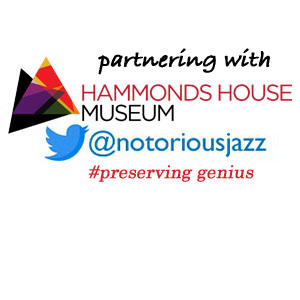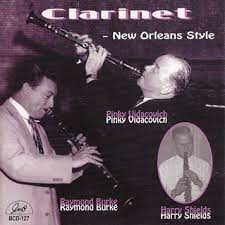
Daily Dose Of Jazz…
Harry Shields was born on June 30, 1899 at 2319 First Street in Uptown, New Orleans, Louisiana, two doors down from Buddy Bolden’s house. He spent almost his whole career in New Orleans. He played with the bands of Norman Brownlee, Sharkey Bonano, Tom Brown, Johnny Wiggs, and others.
Many of his fellow musicians regarded Harry as a superior clarinetist to his brother Larry, who became a noted musician. Wiggs had once commented that Harry was the only clarinetist he’d heard who could always play the right note without fail. He was a part of George Girard and His New Orleans Five, and Johnny Wiggs and His New Orleans Band.
Clarinetist Harry Shields passed away in his hometown on January 19, 1971.
More Posts: clarinet,history,instrumental,jazz,music
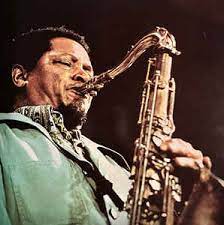
Three Wishes
Queried by Pannonica as to what, if given, would be his three wishes and Illinois Jacquet told her:
1. “That people would become civilized.”
2. “That the whole world would believe in God.”
3. “That everyone would dig music.”
*Excerpt from Three Wishes: An Intimate Look at Jazz Greats ~ Compiled and Photographed by Pannonica de Koenigswarter
More Posts: baroness,history,instrumental,jazz,music,pannonica,saxophone,three,wishes
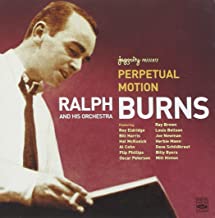
Daily Dose Of Jazz…
Ralph Jose P. Burns was born on June 29, 1922 in Newton, Massachusetts and began playing the piano as a child. Attending the New England Conservatory of Music, he learned the most about jazz by transcribing the works of Count Basie, Benny Goodman and Duke Ellington. While a student, he lived in the home of Frances Wayne, who was an established big band singer and her brother Nick Jerret was a bandleader who began working with him. He found himself in the company of performers as Nat King Cole and Art Tatum.
Moving to New York in the early 1940s, he met Charlie Barnet and the two men began working together. In 1944, he joined the Woody Herman band with members Neal Hefti, Bill Harris, Flip Phillips, Chubby Jackson and Dave Tough. Together, the group developed Herman’s sound. For 15 years, Burns wrote or arranged many of the band’s major hits including Bijou, Northwest Passage, Apple Honey, and on the longer work Lady McGowan’s Dream and the three-part Summer Sequence.
Herman band member Stan Getz was featured as a tenor saxophone soloist on Early Autumn, a hit for the band and the launching platform for Getz’s solo career. Burns also worked in a small band with soloists including Bill Harris and Charlie Ventura. The success of the Herman band provided Ralph the ability to record under his own name. He collaborated with Billy Strayhorn, Lee Konitz and Ben Webster to create both jazz and classical recordings.
Writing compositions for Tony Bennett and Johnny Mathis led to his later work with Aretha Franklin and Natalie Cole. He was responsible for the arrangement and introduction of a string orchestra on two of Ray Charles’s biggest hits, Come Rain or Come Shine and Georgia on My Mind. In the 1990s, Burns arranged music for Mel Tormé, John Pizzarelli, Michael Feinstein and Tony Bennett.
During the 1960s he quit touring as a band pianist and began arranging and orchestrating for Broadway shows including Chicago, Funny Girl, No, No, Nanette, and Sweet Charity. His first film score was for Woody Allen’s Bananas. He worked with Bob Fosse and won an Academy Award for Cabaret, and went on to compose the film scores for Lenny, New York, New York and All That Jazz, the latter garnered an Academy Award. Besides winning Oscars, Burns won an Emmy, a Tony and a Drama Desk Award. From 1996 until his death, he restored many orchestrations for New York City Center’s Encores! series.
Carefully hiding his homosexuality throughout his life, pianist, composer and arranger Ralph Burns, who was posthumously inducted into the New England Jazz Hall of Fame in 2004, passed away on November 21, 2001 from complications of a stroke and pneumonia in Los Angeles, California.
More Posts: arranger,composer,history,instrumental,jazz,music,piano
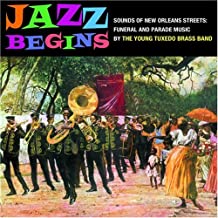
Daily Dose Of Jazz…
Herman Edward Sherman, Sr. was born in New Orleans, Louisiana on June 28, 1923. He played clarinet in high school and later picked up the alto and tenor saxophone. He began working with brass bands on the New Orleans jazz scene around 1940, playing in the Eureka Brass Band, the Onward Brass Band, and the Young Tuxedo Brass Band.
Taking over the leadership of the Young Tuxedo Brass Band in 1971, he remained for the rest of his life. During his tenure the group toured the United States repeatedly and performed in Berlin, Germany in 1980. He led the ensemble in the studio for their 1983 release Jazz Continues on 504 Records.
Occasionally he played in dance bands, but concentrated on his work in brass bands. Saxophonist and bandleader Herman Sherman passed away on September 10, 1984 in his hometown.
More Posts: bandleader,history,instrumental,music,saxophone
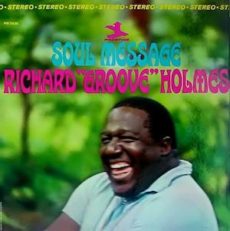
Requisites
Soul Message ~ Richard “Groove” Holmes | By Eddie Carter
This morning’s choice from the library is an album I first heard on our then R&B station in Cleveland, Ohio, WJMO 1490 AM. I knew the song Misty from my uncle’s weekend jazz listening sessions but had never heard it played on the organ before. I called the station and that’s how I discovered organist Richard “Groove” Holmes. Soul Message (Prestige PR 7435/PRST 7435) serves up six delicious tunes of Soul-Jazz that are something special. Gene Daniels on guitar and Jimmie Smith complete the trio, and my copy used in this report is the 1965 US Stereo pressing. Daniels played with Holmes on two earlier albums in 1961 and 1962, Groovin’ With Jug and After Hours. This was Smith’s only time recording with Richard, but he would go on to enjoy a successful career playing with Toshiko Akiyoshi, Benny Carter, Eddie “Lockjaw” Davis, Erroll Garner, Gene Harris, Terry Gibbs, and Joe Pass.
Groove’s Groove, a soulful blues by Holmes starts with an infectious melody compelling one to snap their fingers and tap their toes right away. Richard hits a groove immediately with a marvelous interpretation. Gene follows with a statement as succulent as a huge Sunday meal from Mom’s or Grandma’s kitchen. Holmes returns for a brief anecdote ahead of the finale. Dahoud by Clifford Brown moves the tempo up to a tropical flavor in the opening chorus. Daniels emerges first with a perfectly constructed opening solo. Holmes delves down into the tune’s roots, stating his point with excellent enunciation into the trio’s reprise. Misty by Erroll Garner and Johnny Burke begins on an upbeat note with Richard soaring at length after the melody. Gene and Jimmie propel the song forward into a charming climax. Misty became Richard’s biggest hit and his signature song whenever he performed live.
Side Two starts with the trio easing into the melody of Song For My Father by Horace Silver. Daniels brings blues-rooted energy to the first solo, then Holmes builds on the momentum with a happy performance that he manages tastefully. The Things We Did Last Summer is a beautiful song by Jule Styne and Sammy Cahn. The trio cultivates an irresistible warmth on this 1946 evergreen with a remarkably respectful opening chorus. Richard approaches every note of the lead and closing solos softly and tenderly. Gene completes the gentle mood with a lovely interpretation of romantic reflection before the trio’s delightfully delicate ending. The title track, Soul Message wraps up this set with a cheerful sermon by Holmes who preaches a concise mellow statement with light and airy verses after the catchy melody.
Soul Message was recorded by Rudy Van Gelder and it’s a good recording, but not perfect. On Groove’s Groove during Richard’s second solo, and on Misty, the microphone picks up a bit of distortion in the upper register lasting about one verse on Groove’s Groove and during the second, third and fourth verses on Misty. This is particularly noticeable if you are wearing a good pair of headphones as I do when listening to jazz late at night. These two issues aside, the instruments have a good soundstage on the remainder of the album. Richard also recorded for Groove Merchant, Muse Records, and Pacific Jazz. He passed away from a heart attack on June 29, 1991, at the age of sixty after battling prostate cancer. If you are a fan of the jazz organ or are just discovering the music of Richard “Groove” Holmes, I invite you to audition Soul Message for a spot in your jazz library. It’s a vibrant, inspired album by the organist, and after you’ve heard it, I’m almost certain you’ll get the message!
~ After Hours (Pacific Jazz PJ-59/ST-59), Groovin’ With Jug (Pacific Jazz PJ-32/ST-32) – Source: Discogs.com ~ Misty – Source: JazzStandards.com ~ Richard “Groove” Holmes, Jimmie Smith, The Things We Did Last Summer – Source: Wikipedia.org © 2021 by Edward Thomas Carter
More Posts: choice,classic,collectible,collector,history,instrumental,jazz,music,organ


